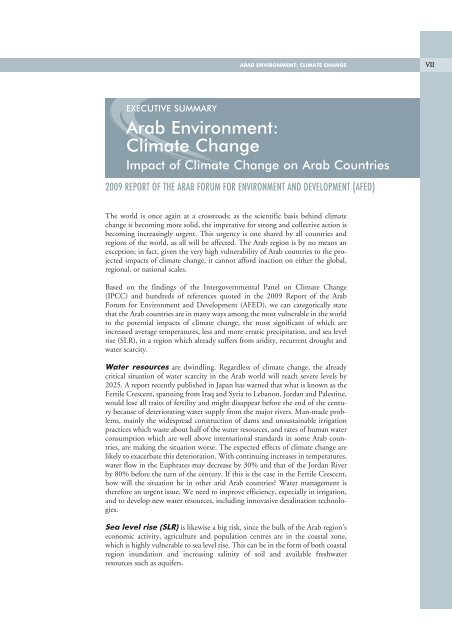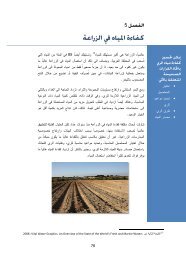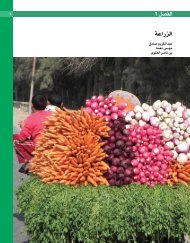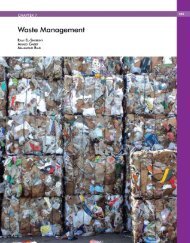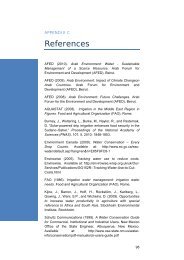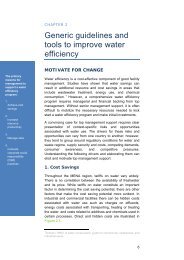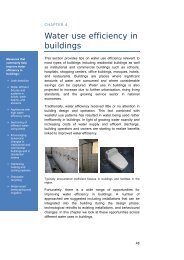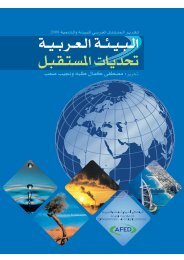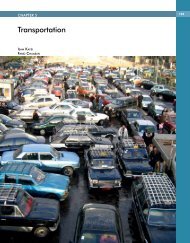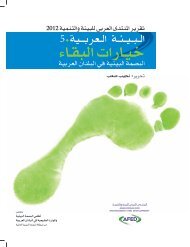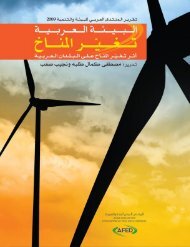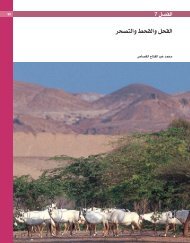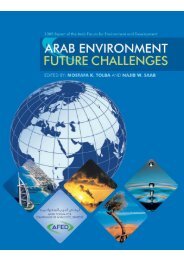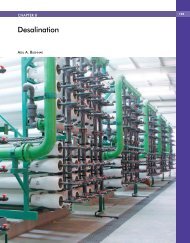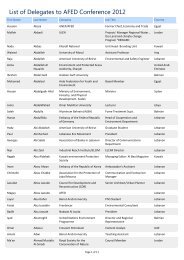Impact of Climate Change on Arab Countries - (IPCC) - Working ...
Impact of Climate Change on Arab Countries - (IPCC) - Working ...
Impact of Climate Change on Arab Countries - (IPCC) - Working ...
You also want an ePaper? Increase the reach of your titles
YUMPU automatically turns print PDFs into web optimized ePapers that Google loves.
ARAB ENVIRONMENT: CLIMATE CHANGE<br />
VII<br />
EXECUTIVE SUMMARY<br />
<strong>Arab</strong> Envir<strong>on</strong>ment:<br />
<str<strong>on</strong>g>Climate</str<strong>on</strong>g> <str<strong>on</strong>g>Change</str<strong>on</strong>g><br />
<str<strong>on</strong>g>Impact</str<strong>on</strong>g> <str<strong>on</strong>g>of</str<strong>on</strong>g> <str<strong>on</strong>g>Climate</str<strong>on</strong>g> <str<strong>on</strong>g>Change</str<strong>on</strong>g> <strong>on</strong> <strong>Arab</strong> <strong>Countries</strong><br />
2009 REPORT OF THE ARAB FORUM FOR ENVIRONMENT AND DEVELOPMENT (AFED)<br />
The world is <strong>on</strong>ce again at a crossroads; as the scientific basis behind climate<br />
change is becoming more solid, the imperative for str<strong>on</strong>g and collective acti<strong>on</strong> is<br />
becoming increasingly urgent. This urgency is <strong>on</strong>e shared by all countries and<br />
regi<strong>on</strong>s <str<strong>on</strong>g>of</str<strong>on</strong>g> the world, as all will be affected. The <strong>Arab</strong> regi<strong>on</strong> is by no means an<br />
excepti<strong>on</strong>; in fact, given the very high vulnerability <str<strong>on</strong>g>of</str<strong>on</strong>g> <strong>Arab</strong> countries to the projected<br />
impacts <str<strong>on</strong>g>of</str<strong>on</strong>g> climate change, it cannot afford inacti<strong>on</strong> <strong>on</strong> either the global,<br />
regi<strong>on</strong>al, or nati<strong>on</strong>al scales.<br />
Based <strong>on</strong> the findings <str<strong>on</strong>g>of</str<strong>on</strong>g> the Intergovernmental Panel <strong>on</strong> <str<strong>on</strong>g>Climate</str<strong>on</strong>g> <str<strong>on</strong>g>Change</str<strong>on</strong>g><br />
(<strong>IPCC</strong>) and hundreds <str<strong>on</strong>g>of</str<strong>on</strong>g> references quoted in the 2009 Report <str<strong>on</strong>g>of</str<strong>on</strong>g> the <strong>Arab</strong><br />
Forum for Envir<strong>on</strong>ment and Development (AFED), we can categorically state<br />
that the <strong>Arab</strong> countries are in many ways am<strong>on</strong>g the most vulnerable in the world<br />
to the potential impacts <str<strong>on</strong>g>of</str<strong>on</strong>g> climate change, the most significant <str<strong>on</strong>g>of</str<strong>on</strong>g> which are<br />
increased average temperatures, less and more erratic precipitati<strong>on</strong>, and sea level<br />
rise (SLR), in a regi<strong>on</strong> which already suffers from aridity, recurrent drought and<br />
water scarcity.<br />
Water resources are dwindling. Regardless <str<strong>on</strong>g>of</str<strong>on</strong>g> climate change, the already<br />
critical situati<strong>on</strong> <str<strong>on</strong>g>of</str<strong>on</strong>g> water scarcity in the <strong>Arab</strong> world will reach severe levels by<br />
2025. A report recently published in Japan has warned that what is known as the<br />
Fertile Crescent, spanning from Iraq and Syria to Leban<strong>on</strong>, Jordan and Palestine,<br />
would lose all traits <str<strong>on</strong>g>of</str<strong>on</strong>g> fertility and might disappear before the end <str<strong>on</strong>g>of</str<strong>on</strong>g> the century<br />
because <str<strong>on</strong>g>of</str<strong>on</strong>g> deteriorating water supply from the major rivers. Man-made problems,<br />
mainly the widespread c<strong>on</strong>structi<strong>on</strong> <str<strong>on</strong>g>of</str<strong>on</strong>g> dams and unsustainable irrigati<strong>on</strong><br />
practices which waste about half <str<strong>on</strong>g>of</str<strong>on</strong>g> the water resources, and rates <str<strong>on</strong>g>of</str<strong>on</strong>g> human water<br />
c<strong>on</strong>sumpti<strong>on</strong> which are well above internati<strong>on</strong>al standards in some <strong>Arab</strong> countries,<br />
are making the situati<strong>on</strong> worse. The expected effects <str<strong>on</strong>g>of</str<strong>on</strong>g> climate change are<br />
likely to exacerbate this deteriorati<strong>on</strong>. With c<strong>on</strong>tinuing increases in temperatures,<br />
water flow in the Euphrates may decrease by 30% and that <str<strong>on</strong>g>of</str<strong>on</strong>g> the Jordan River<br />
by 80% before the turn <str<strong>on</strong>g>of</str<strong>on</strong>g> the century. If this is the case in the Fertile Crescent,<br />
how will the situati<strong>on</strong> be in other arid <strong>Arab</strong> countries Water management is<br />
therefore an urgent issue. We need to improve efficiency, especially in irrigati<strong>on</strong>,<br />
and to develop new water resources, including innovative desalinati<strong>on</strong> technologies.<br />
Sea level rise (SLR) is likewise a big risk, since the bulk <str<strong>on</strong>g>of</str<strong>on</strong>g> the <strong>Arab</strong> regi<strong>on</strong>'s<br />
ec<strong>on</strong>omic activity, agriculture and populati<strong>on</strong> centres are in the coastal z<strong>on</strong>e,<br />
which is highly vulnerable to sea level rise. This can be in the form <str<strong>on</strong>g>of</str<strong>on</strong>g> both coastal<br />
regi<strong>on</strong> inundati<strong>on</strong> and increasing salinity <str<strong>on</strong>g>of</str<strong>on</strong>g> soil and available freshwater<br />
resources such as aquifers.


